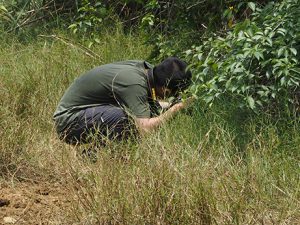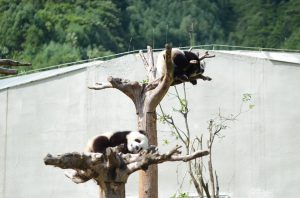Yichao is a WEC master’s student. He is studying how environmental and social factors influence the distribution of giant pandas in the Wolong Nature Reserve in Sichuan, China. His advisor is Dr. Vanessa Hull.
Work
When did you know you wanted to work in wildlife? Is there an origin story?
I’ve been interested in nature since I was very young.
I started out interested in insects. As an undergrad, I had some experiences with wildlife research. I used to volunteer with white headed langurs- a primate species, and Chinese white dolphins. That was the first time I was involved with mammal research.
What’s one word that describes how you work?
Flexibly!
What’s your favorite organism you’ve studied and why?
I think that would be Asian box turtles. I studied two species. They have a very interesting natural history. They can close up their shells to protect themselves from predators. They are also incredibly endangered, and I really liked that I could do something for these amazing, but endangered, species.

What’s an unexpected experience you’ve had because of your work?
Working with people from rural areas of China. I’m from Beijing, which is a big city. Before I went to rural areas to do my Giant Panda research, I didn’t know that there are cultural differences between urban and rural China. That was kind of a challenge, but also very interesting.
It’s important to learn about their culture. For example, they drink a lot. They use drinking as a way of socializing with each other. I didn’t expect to learn about culture during my wildlife research.
Is drinking the main difference between the city and rural areas?
There are a lot of differences.
The area I’m working in, the majority of people are not Han Chinese, they are Tibetans and Qiang people, who have very difference cultures. For example, they have a very different dialect, which can be very difficult for me to understand.
What’s your go-to tool?
Computers.
Lifestyle
How do you manage your time?
I’m actually not very good at managing my time. I’m still learning!
I would say the best way to manage time is to set some non-negotiable time periods to do things you think are really important, like homework and research. You can have hobbies, but you have to do them outside of the time periods when you should be doing your work.
How do you balance long periods in the field with your personal life?
I don’t think it effects my personal life a lot, because of the internet and cell phones.
Maybe after I have a family, it will be a bigger problem, but right now I just enjoy being in the field.
What are you currently reading?

Recently I have been reading E. O. Wilson’s “Letters to a Young Scientist”. It’s a very nice book!
In Closing
If you could go back in time to when you started college and give yourself one piece of advice, what would you say?
I don’t think I’m wise enough yet to give myself advice.
Is there anything else you’d like to tell people?
I really appreciate the environment that WEC gives its students. I’m going to take full advantage of it!

~
This interview by Rhett Barker, and lightly edited for clarity by Rhett Barker and Claire Williams.
Thanks to Yichao for sitting down with us.
The concept for this interview is based on an interview series by the University of Washington called How UW Works, which is in turn based on a series called How I Workby LifeHacker magazine.
 0
0
